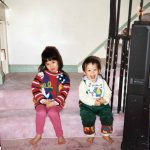How Social and Emotional Learning Can Promote Children’s Health and Wellbeing
Last year, I worked with a six-year-old child struggling to pay attention in school and having difficulty making friends. Like many kids across the United States and the world, he had been in and out of school and had only inconsistently interacted with peers because of the pandemic. The inconsistency of his life and school experience was making him feel sad, lonely, and insecure. One bit of consistency in this child’s chaos was our weekly in person (masked!) visit. Each week in therapy, we played, wrote stories, and drew pictures together.
This is a small story, but it is important: Through our regular visits, this child learned how to express himself in healthy ways, how to ask for help, and how to cope with challenging situations. This very child who was having extreme difficulty interacting with others recently showed me a picture of him smiling next to his group of friends.

What is social and emotional learning and how is it related to mental health?
The months of playing, writing, and drawing with this little boy as a child psychiatrist were addressing a mental health challenge, but our work together was rooted in the principles of social and emotional learning (SEL). SEL is a longstanding educational concept aimed at teaching children skills such as understanding perspectives, coping with stress, identifying and expressing feelings, and resolving conflicts with other people.
The goal of social and emotional learning is preparing our children to live fulfilling lives, maintain strong relationships with others, thrive academically and personally, and contribute to the world around them.
Incorporating social and emotional learning into children’s early and elementary years can help kids who may already have mental health issues such as anxiety, depression, and trauma, or prevent these challenges from developing them down the line. These skills are the building blocks for children to learn to successfully navigate difficult situations that they often inevitably face, no matter how much we try to protect our children, in the context of a complicated world. (Some children will experience challenges and need mental health support, even if they’re learning social and emotional skills; if you ever have a concern about your child’s mental wellness, please consult with your pediatrician.)
Through decades of research, we know that SEL works: One large-scale study that analyzed more than 200 studies in schools across the nation found that SEL interventions improved students’ attitudes around helping others, helped decrease conflicts in school (including violence), increased students’ ability to identify emotions, and even improved academic achievement. Another study of a program called RULER in over 60 schools found that the SEL program caused students to have less anxiety and depression, better social skills, leadership skills, academic performance, and attention, and even led to less bullying. Another study looking at almost twenty schools in Baltimore followed kids for more than 15 years and found that an SEL program lowered the risk of developing suicidal thoughts by age 19.
Overall, the research shows that social and emotional learning, starting at a young age when the brain is most malleable, can set children up for success years later, as teenagers and beyond.
Developing social and emotional skills is always important, but it is especially vital today, as children and caretakers across the country are reporting increased feelings of unhappiness and highlighting the negative impacts of the pandemic on mental health and wellbeing. Several child mental health organizations declared a national mental health emergency for children in 2021. With mental health challenges on the rise for American kids, children need to develop the skills that will help them to adapt and deal with changing and stressful situations.
Three ways to help children develop strong social and emotional skills
During especially trying and unpredictable times, it can feel scary and daunting to prepare children for problems and challenges that even adults can’t understand or predict. Incorporating social and emotional learning into children’s daily lives can help them develop skills that will support their long-term mental health. Here are three strategies that I have found to be both easily to implement and also effective with young children:
- Modeling and practicing identifying feelings: This is one of my favorites! Young ones are still learning to understand what emotions are, what they mean, and how to recognize emotions in themselves and others, and how to cope with different feelings. I recently worked with a young girl to create cards for each of the feelings; we used the cards to practice identifying and responding to different emotions. This body chart worksheet is great to help a child understand how they may experience feelings in their body — such as a tummy ache or clammy hands. You can also model for your child when you have a certain emotion. When YOU talk about your feelings, this helps your child understand that all emotions are acceptable: feeling bad doesn’t mean you are bad. Say something like “When I watched that part of the movie, I felt a little sad and my throat felt tight.”
- Practicing problem solving: One evening, I got locked out of my office! I used the time with the child I was working with to “solve” the mystery. This empowered him while helping me to solve the problem of the locked office door. We thought of simple but different ways to get inside the office, such as asking someone for help, looking in my purse for the key, or seeing if we could find another office to borrow. This was an untraditional therapy session, but it showed the child that problems and mistakes are normal, and that even at a young age, he had so much to offer in helping solve the problem! The same goes for solving the problems that come up between people and thinking through how to resolve interpersonal conflicts. You can incorporate problem-solving spontaneously and turn situations that may cause a change in plans as a learning opportunity.
- Building empathy: Children today are growing up during times of conflict and disagreement. Research tells us that the ability to understand and take on others’ perspectives actually helps people to build resilience and can prevent mental health challenges down the line. I often let children lead the way in our play and build in opportunities to grow empathy. For example, when a child I worked with expressed frustration with her baby sister, we practiced role-playing (I was the baby and then she played the baby) and played a guessing game of what the other person was feeling. Using stuffed animals and puppets can often help young children to role-play and can help young kids express themselves more openly. Reading stories or listening to podcasts related to empathy are also helpful in modeling empathy for young children. I love the Little Kids, Big Hearts empathy episode, What is Empathy?, as well as the book lists from Big Heart World related to empathy.
At the end of the day, we all want our kids to experience the beauty in the world, to bask in the joys of exploration, to stand back up when they fall, and to follow their big hearts. And in order to do that, we must nurture both their physical and emotional wellbeing. As a child psychiatrist and former teacher, I have seen SEL change the lives of children from all walks of life, in the clinic, at school, or in the home.


